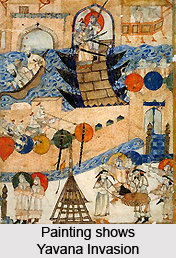 According to Patanjali`s Mahabhasya, scholars believe that there was really a Yavana invasion during Pusyamitra`s rule. Yavanas besieged Saket (Ayodhya), Madhyamika (near Chittor). From Patanjali`s illustrations it does not absolutely follow that the Yavana invasion of Saket and Madhyamika occurred during Pusyamitra`s reign. In this connection it may be noted that the Yuga Purana section of the Gargi Samhita does speak of a Yavana invasion of North-India after the reign of a Maurya king. Maurya Empire probably came to an end in 187 B.C. and if it is attributed to Yavana invasion, its leader naturally had been Demetrius.
According to Patanjali`s Mahabhasya, scholars believe that there was really a Yavana invasion during Pusyamitra`s rule. Yavanas besieged Saket (Ayodhya), Madhyamika (near Chittor). From Patanjali`s illustrations it does not absolutely follow that the Yavana invasion of Saket and Madhyamika occurred during Pusyamitra`s reign. In this connection it may be noted that the Yuga Purana section of the Gargi Samhita does speak of a Yavana invasion of North-India after the reign of a Maurya king. Maurya Empire probably came to an end in 187 B.C. and if it is attributed to Yavana invasion, its leader naturally had been Demetrius.
This article is a stub. You can enrich by adding more information to it. Send your Write Up to content@indianetzone.com



















